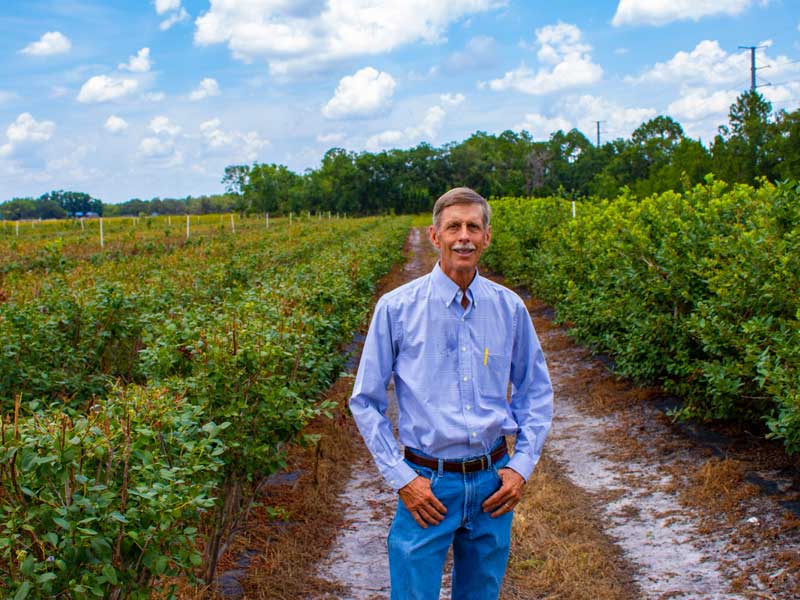by DAPHNE RENELUIS
A central Florida resident since 1980, David Weber has become a staple in the central Florida blueberry industry. Weber developed an interest in blueberries and agriculture at a young age because he grew up near a small blueberry patch in New York as a child. This early exposure to blueberries and agriculture combined with his natural knack for science led Weber to major in botany when he moved to Florida to attend college.
Although exposed to blueberries at a young age, growing that particular fruit was not a thought in Weber’s mind until a friend suggested he grow some here in Polk County. At the time that this friend made this suggestion, Weber was working as a custom pesticide applicator and was already looking for a high value, low acreage crop to grow in the central Florida region. Thus, the idea of growing blueberries made sense.
When his friend suggested that Weber grow blueberries, he also suggested that Weber talk to University of Florida blueberry breeder Dr. Paul Lyrene to gain some insight on the blueberry breeding industry. In Weber and Dr. Lyrene’s conversations, Lyrene warned Weber against growing blueberries in the central Florida area due to the low amount of chill hours here. Despite this warning, Weber remained determined to successfully breed blueberries in Central Florida.
With this determination, Weber planted an acre of Sharpeblue blueberries in Winter Haven in 1988 as a challenge to the conventional thinking of that time. Weber began to do extensive cross breeding of blueberries to develop new varieties that would hopefully grow successfully in the Central Florida environment. Weber’s persistence eventually paid off after thousands and thousands of experiments through trial and error, as he soon developed the now highly successful Winter Bell blueberry variety in Winter Haven, Florida.
“The Winter Bell was well above any of the common commercial varieties on yield breaker. I’ve been exclusively growing that since. They sell out all the time and are in really good demand. In fact, Winter Bell was getting over more than double the yield in pounds as the other blueberry breeds as a mature plant. That’s where we stand today. We are expanding and propagating more and more plants and trying to keep up with the demand we currently have,” explains Weber.
Due to the Winter Bell blueberry’s success, Weber was ultimately able to develop the Florida Blueberry Nursery after learning the painstaking details of propagation. Weber began to produce his own plants, staying small, focusing on producing enough for himself and his family and selling the rest to other growers.
This vigorous and highly productive Winter Bell blueberry plant could adapt to central Florida soil by requiring less chill hours. Chill hours are the amount of hours that a plant needs to be in cool weather of under 45 degrees Fahrenheit. As one of the first people to successfully breed blueberries in the central Florida area, Weber also became one of the first ones to figure out how to lower the number of chill hours needed by Florida blueberries. Since then, many breeders and farmers have capitalized on this discovery by applying some of the same chill hour lessening techniques to their blueberries to sell them at every market window. This is especially true in Mexico, Peru, and other Latin American countries.
Due to this newfound competition, the Florida blueberry industry as a whole has had to work harder to stay competitive in the field.
“All I can say is that we are trying to produce varieties to keep us competitive, which means producing more with less,” states Weber. “That means producing varieties that are less susceptible to diseases so we don’t have to produce as much on control. You can’t control the market so all you can do is control your costs.” This need to control costs is vital for the Florida blueberry industry if it wants to remain a profitable business.
“The highest cost we have is harvesting cost. To be even more profitable we need the prices to be higher than our costs. You have to keep up with the market window of all your competitors across the U.S. and Latin America,” Weber explains.
Although it is a tough industry to be in at times, Weber has no regrets when it comes to entering the blueberry industry. “I’ve been blessed,” Weber claims when talking about the affects working in the blueberry industry has had on his life. “The success of the Winter Bell variety has been great. Now all I have to do is top that.” When giving his piece of advice on how blueberry farmers and breeders that are just entering the industry can be just as successful as Weber has been in the past, Weber says, “Start small, learn everything you can, and make your mistakes on a small piece of land. Get expert advice until you can stand on your own.”

